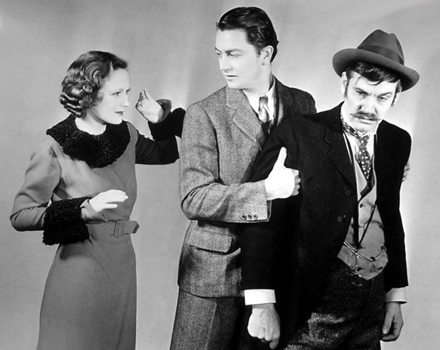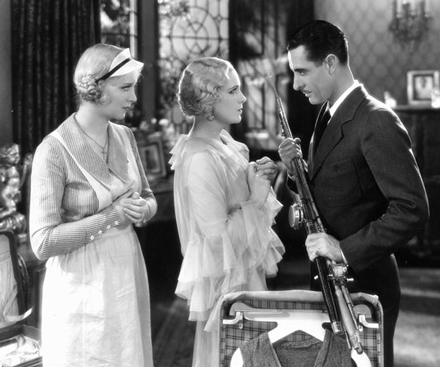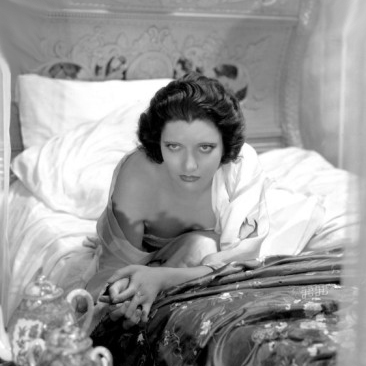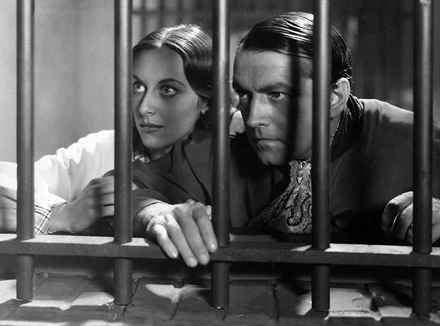
 |
|
|
|
If we've learned anything from various studios' disc collections, it's that 1930s Pre-code films are more interesting, more daring and even more relevant than the much-touted wave of 1970s 'director's cinema'. When the ratings system arrived producers and self-styled auteurs could film a wide latitude of content for the screen. But title for title, the Pre-codes of the early Depression years express more raw sexuality and pointed social comment, in a culture not prone to tolerate either. The branded line 'Forbidden Hollywood' was coined by some creative soul at Warner Home Video around 1991 as way to attractively package saucy pictures with racy dialogue, peek-a-boo costumes and frank sexual content. It was amusing to see films in which the leading ladies change their clothing every few scenes just for thrills, or pictures in which women were the sexual aggressors. Many of these films had been heavily cut for television or were simply pulled from exhibition when Code enforcement came in 1934. Strangely enough, the deeper this series digs into the hopper of (mostly WB and MGM) Pre-code titles, the more interesting they become. Warners Forbidden Hollywood Collection Volume 6 collects four features most of us have probably never heard of. But each is a superior example of exactly what made the Pre-code era great. We get serious social comment, the unexpurgated story of a sexual predator, a tale of a woman sold into sex slavery, and a searing drama about injustice to Native Americans that puts to shame so-called 'enlightened' exposés of later decades. 1932's The Wet Parade is a literal adaptation of Upton Sinclair's muckraking novel about the evils of alcohol. It's pretty much unknown today, possibly owing to a lumpy story structure carried straight from the book. Its stars Dorothy Jordan (who much later played Martha in John Ford's The Searchers) and a very green Robert Young play young people, both of whom lose their fathers (Lewis Stone & Walter Huston) to the evils of drink. 
The movie's power comes from its frank assessment of the truth of drinking pre- and post- prohibition. Stone guzzles himself to death with the full encouragement of his peers, while Huston becomes a swindler and a thief to support his habit. When the country goes 'dry', booze is more plentiful than ever -- and even more popular. What's worse, the next generation is just as badly affected. Dorothy's brother Neil Hamilton (from TV's Batman) ignores the fact that his father committed suicide by cutting his own throat in a pigsty. He courts disaster drinking whatever spirits come his way. Jordan and Young remain abstainers. He becomes a prohibition agent working in vain against an unprecedented new culture of lawlessness. The director of note is Victor Fleming. Dramatically speaking, the show lurches forward fairly clumsily. Jordan's Southern accent is charming, Young is a likeable fellow and Walter Huston predictably steals the show as a man completely corrupted by booze, who attacks his wife when she tries to put her foot down. Not until the documentary Prohibition did we again hear of a little-publicized anti-bootlegging tragedy: for a period of time the government purposely poisoned alcohol supplies, knowing that they would fall into the hands of bootleggers. Neil Hamilton is one of the unlucky victims. Myrna Loy has a couple of good scenes as an insufferable playgirl. Jordan's mother is played endearingly by Clara Bandick, the beloved Auntie Em from The Wizard of Oz. In an attempt to lighten the proceedings, Jimmy Durante plays Robert Young's buddy on the prohibition squad. He's of course a major jokester. Handsomely restored by the WAC, The Wet Parade is a major find. Downstairs changes gears to tell the story of an unmitigated heel, cast from the original mold. In an effort to save his career, John Gilbert lobbied to play a dastardly villain who leaves a wake of discord in the household of a German Baron. The head butler Albert (Paul Lukas) is so respected that the Baron and Baroness (Reginald Owen & Olga Baclanova) make his wedding to the upstairs maid Anna (Virginia Bruce) a fancy garden affair. The intruder is Karl (John Gilbert), a chauffeur who makes his way through life by seducing and blackmailing the servants downstairs as well as the ladies upstairs. The Baroness foolishly submits to Karl's romantic advances, which he uses to guarantee his position. He then beds the foolish older cook Sophie (Bodil Rosing) with the aim of stealing her life savings. The calculating Karl also uses stealth and deception to get the new bride Anna alone. Albert is tipped to the affair but finds he can no longer hire and fire the staff -- Karl threatens to expose the Baroness's infidelity if she allows Albert to dismiss him. 
According to Hollywood lore there was nothing wrong with John Gilbert's voice; Louis B. Mayer wanted him out and arranged for his reputation to be shattered. Downstairs proves that the actor had everything necessary to continue as a top leading man. It's a truly gutsy move to play such a hiss-able lout, who smiles as he puts the squeeze on everyone around him. We're soon hoping that Karl will eventually get his just desserts, but in Pre-code films the triumph of goodness is never guaranteed. Two scenes are real standouts. The chubby, over-aged Sophie gets a racy bathtub scene, after which she begs Karl for mercy. He instead ignores her while brushing up his hair, picking his nose and ears in front of her to show his contempt. The second is a highlight of the Pre-code era. Anna rebels when the straight-laced Albert confronts her with her "sin." Anna instead fires back at him, protesting that she's glad she strayed. Karl was a passionate lover, and the sex she had with him was an exciting adventure that no woman should have to do without. I've never seen such a frank and open statement in defense of plain ordinary sex in any movie, of any kind. Virginia Bruce should have remained much better known, just for this one scene. Reginald Owen is an old fool, while the exotic Olga Baclanova (Freaks) proves she can read dialogue perfectly clearly. Paul Lukas may not be a great lover but he's a definite good guy. Hedda Hopper and Karen Morley play other titled housewives far too easily seduced by the unprincipled Karl. The good direction is by producer Monta Bell, a fairly big name who the next year switched over to producing exclusively. Mandalay begins as a fairly standard exotic romance in the South China Sea, with Ricardo Cortez playing a handsome smuggler and his paramour Kay Francis doing what she does best, wear great clothing for the Depression-Era theatergoers to ogle. Put on the spot, Cortez squares a debt with crooked impresario Warner Oland by handing over Francis as a new attraction for Oland's nightclub-casino. Taking the advice of another enslaved woman to make the best of things, Francis sings for her supper while bilking a succession of military men and politicians, who shower her with gifts in return for (presumed) sexual favors. Francis earns her freedom but keeps on seducing men until she's booted out of town. On the river steamer to Mandalay she meets a doctor played by Lyle Talbot. Another lost soul, Talbot is going en route to put down a fever plague in some hellhole upriver; Francis rightly guesses that he really wants to kill himself doing something virtuous. She feels the same way about her own past. But that rascal Cortez, now a fugitive from justice, has taken the same boat and hopes to use Francis to help him escape. Cortez thinks he can make the women he sold into slavery love him again, just by animal magnetism. Much to her distress, Francis isn't sure what she feels any more. 
Director Michael Curtiz has his signature style down pat in Mandalay, staging complicated wide shots that rarely have fewer than three relevant things happening at once. Cameraman Tony Gaudio lays on the gauze to augment the steamy nightclub scenes, yet the cool seductress Kay Francis never seems to wilt. The riverboat scenes are impressive as well, and free of Sadie Thompson -style moralizing. Ruth Donnelly plays a square from Topeka who notices Francis's romance with Talbot's morose doctor, yet is still friendly and thoughtful. The movie manages to convince us that Francis has become a class-A harlot, but is still capable of atonement. When sinking into Sin, she adopts the name "Spot White", possibly because "Shanghai Lil" was taken.
Without giving details, let me say that Mandalay ends with a bona fide Code no-no, the kind of finish that was common in books and short stories but that Hollywood's The fourth entry in the show, Massacre, is about the plight of the noble Native American, a subject the movies have never addressed with much competence, even in the Little Big Man -- Sasheen Littlefeather '70s. Directed by Alan Crosland, this entertaining yet hard-hitting drama lays out the whole story in efficient fashion, presenting a persuasive case despite the fact that the leading Indian hero is once again played by a white actor. 
Actually, Richard Barthelmess is an excellent choice. Both he and co-star Ann Dvorak star in some of the best socially progressive Pre-codes. Nobody suffers injustice better than Barthelmess, in movies like The Last Flight and Heroes for Sale. Before being unceremoniously booted out of Hollywood for her union activities, Ms. Dvorak was the queen of transgressive or downtrodden Depression-era victims, in pictures like Scarface and Three on a Match. It's ironic that the studio of social comment should clobber actors that tried to practice what its movies preached. The clever screenplay does a turnabout on audience expectations. Cocky Wild West show headliner Joe Thunderhorse (Barthelmess) fakes his Indian background, as he hasn't been home since his teen years and knows little about his people's customs. He returns to the reservation in his swank convertible, accompanied by his servant Sam (Clarence Muse), only to find that an Indian Agent and a crooked government doctor (Dudley Digges and Arthur Hohl) are looting tribal funds and cheating Indians of their property. The doctor has never bothered to attend to Joe's father, who has died from lack of medical attention. But Joe goes berserk when another of the white crooks (Sidney Toler) leeching off the tribe rapes his little sister, Jennie (Agnes Narcha). Tribal office secretary Lydia (Ann Dvorak) initially thinks Joe is a fraud but is encouraged when he fights back. After the Indian Agent arrests him for murder, the previously docile tribesmen, Lydia and even Sam rush to help. Joe knows the head of the Indian Affairs committee in Washington, but his case may be ruined: his fellow Indians storm the local town and burn down the unjust courthouse. Massacre plays with several kinds of dynamite. Besides the interracial rape, there's a scene in which Joe dismisses the local Christian preacher, rejecting the Indian Agent's insistence that the tribe give up their 'pagan' ways. Joe also attacks an exploitative camera crew hiring Indians to help sell a cheap product, all arranged to profit the Agency. When Joe is arrested, he's tried before a handpicked kangaroo court that does whatever the Indian Agent wants. Despite Joe and Lydia's calls for a measured response, the movie is a bigger call to revolution than I Am a Fugitive from a Chain Gang. It's strong stuff, but also a fun picture. Clarence Muse is given plenty of smart lines that allow him to compare the Indians' treatment with black slavery. Muse is also an intelligent good guy, driving Joe's car during an escape attempt to lead the cops astray. Back in New York, Joe's phony Indian act gets a good ribbing. He's really an All-American fellow taking full advantage of his star status. When the wig and feathers come off he wastes no time romancing a spoiled playgirl (Claire Dodd, WB's all-purpose tramp in silk gowns). She fills a room with Indian artifacts to impress Joe, but he has no idea what they are. Reservation Indians have forgotten their culture in just a couple of generations. 
The Warner Archive Collection DVD-R of Warners Forbidden Hollywood Collection Volume 6 will delight collectors wondering what other gems are still out there. These four are so good that I have to assume they were held up only while waiting their turn for decent transfers. A few show element wear but all are intact, in excellent quality and with punchy soundtracks. Trailers are included. The next Forbidden Hollywood volume is already out ... it contains more familiar titles like Skyscraper Souls and Employee's Entrance. I'll be getting to it in a week or so.
On a scale of Excellent, Good, Fair, and Poor,
Reviews on the Savant main site have additional credits information and are often updated and annotated with reader input and graphics. Also, don't forget the 2011 Savant Wish List. T'was Ever Thus.
Review Staff | About DVD Talk | Newsletter Subscribe | Join DVD Talk Forum |
| ||||||||||||||||||